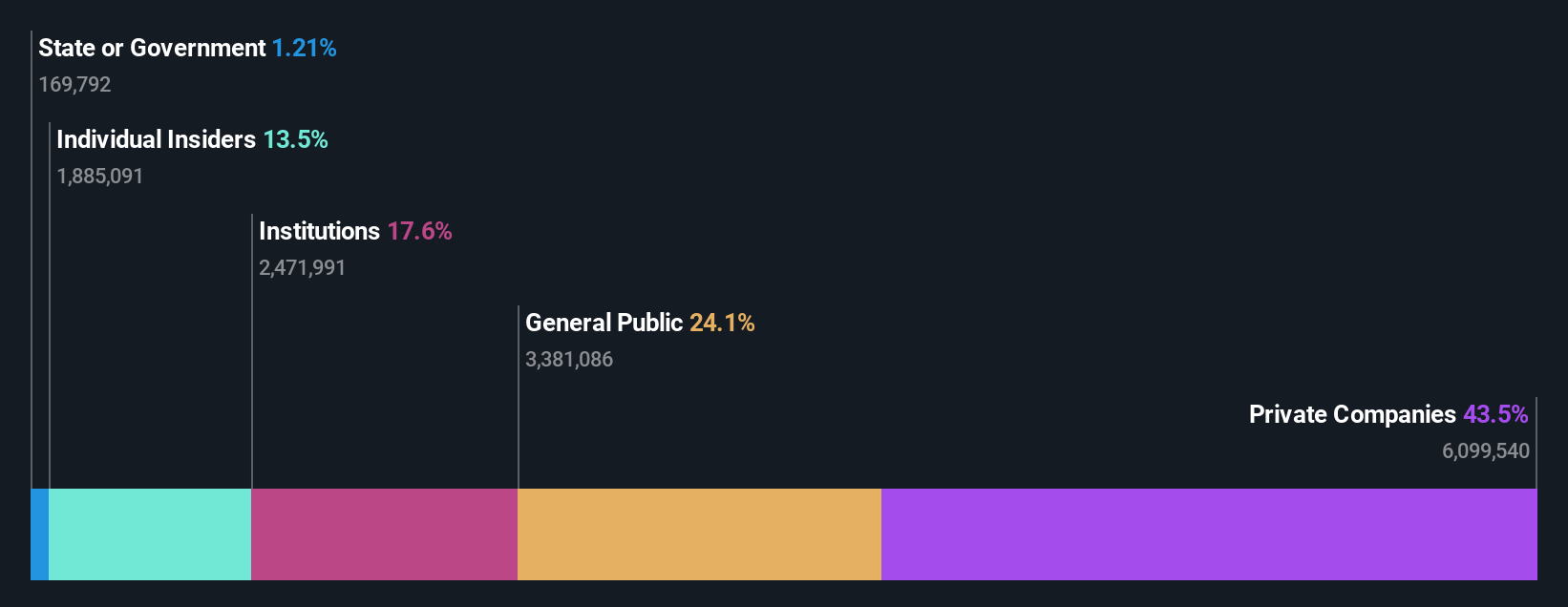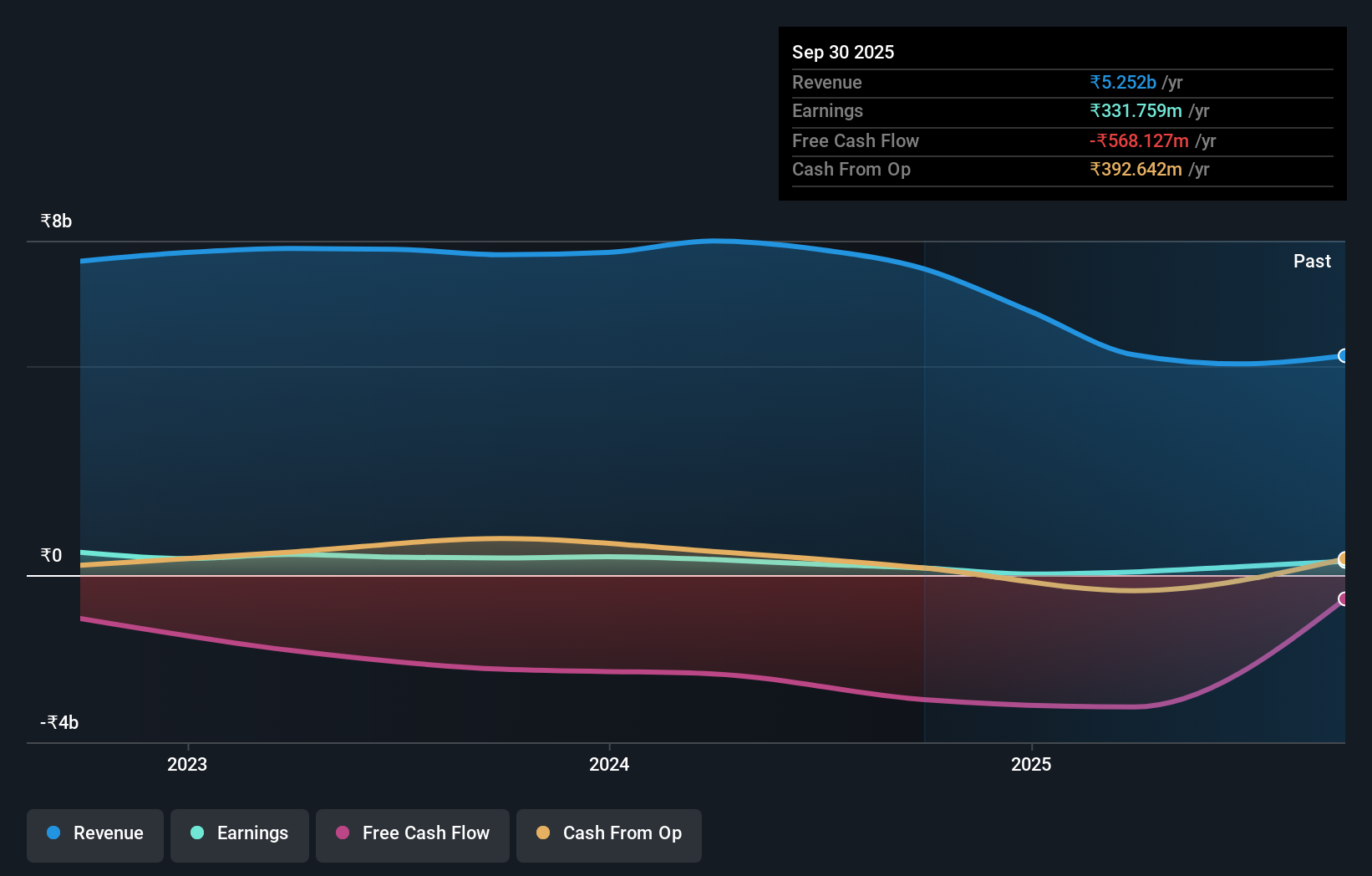- India
- /
- Basic Materials
- /
- NSEI:DECCANCE
Deccan Cements Limited's (NSE:DECCANCE) market cap dropped ₹1.4b last week; Private companies bore the brunt
Key Insights
- Significant control over Deccan Cements by private companies implies that the general public has more power to influence management and governance-related decisions
- A total of 3 investors have a majority stake in the company with 56% ownership
- Insiders own 13% of Deccan Cements
Every investor in Deccan Cements Limited (NSE:DECCANCE) should be aware of the most powerful shareholder groups. The group holding the most number of shares in the company, around 44% to be precise, is private companies. That is, the group stands to benefit the most if the stock rises (or lose the most if there is a downturn).
And following last week's 10% decline in share price, private companies suffered the most losses.
Let's take a closer look to see what the different types of shareholders can tell us about Deccan Cements.
Check out our latest analysis for Deccan Cements

What Does The Institutional Ownership Tell Us About Deccan Cements?
Institutions typically measure themselves against a benchmark when reporting to their own investors, so they often become more enthusiastic about a stock once it's included in a major index. We would expect most companies to have some institutions on the register, especially if they are growing.
We can see that Deccan Cements does have institutional investors; and they hold a good portion of the company's stock. This implies the analysts working for those institutions have looked at the stock and they like it. But just like anyone else, they could be wrong. It is not uncommon to see a big share price drop if two large institutional investors try to sell out of a stock at the same time. So it is worth checking the past earnings trajectory of Deccan Cements, (below). Of course, keep in mind that there are other factors to consider, too.

Deccan Cements is not owned by hedge funds. Melvillie Finvest Ltd is currently the largest shareholder, with 35% of shares outstanding. Lakshmi Manthena is the second largest shareholder owning 12% of common stock, and DCL Exim Ltd holds about 8.8% of the company stock.
A more detailed study of the shareholder registry showed us that 3 of the top shareholders have a considerable amount of ownership in the company, via their 56% stake.
While it makes sense to study institutional ownership data for a company, it also makes sense to study analyst sentiments to know which way the wind is blowing. We're not picking up on any analyst coverage of the stock at the moment, so the company is unlikely to be widely held.
Insider Ownership Of Deccan Cements
The definition of an insider can differ slightly between different countries, but members of the board of directors always count. Company management run the business, but the CEO will answer to the board, even if he or she is a member of it.
I generally consider insider ownership to be a good thing. However, on some occasions it makes it more difficult for other shareholders to hold the board accountable for decisions.
Our most recent data indicates that insiders own a reasonable proportion of Deccan Cements Limited. It has a market capitalization of just ₹12b, and insiders have ₹1.7b worth of shares in their own names. We would say this shows alignment with shareholders, but it is worth noting that the company is still quite small; some insiders may have founded the business. You can click here to see if those insiders have been buying or selling.
General Public Ownership
The general public, who are usually individual investors, hold a 24% stake in Deccan Cements. While this group can't necessarily call the shots, it can certainly have a real influence on how the company is run.
Private Company Ownership
Our data indicates that Private Companies hold 44%, of the company's shares. It might be worth looking deeper into this. If related parties, such as insiders, have an interest in one of these private companies, that should be disclosed in the annual report. Private companies may also have a strategic interest in the company.
Next Steps:
While it is well worth considering the different groups that own a company, there are other factors that are even more important. For example, we've discovered 2 warning signs for Deccan Cements that you should be aware of before investing here.
Of course, you might find a fantastic investment by looking elsewhere. So take a peek at this free list of interesting companies.
NB: Figures in this article are calculated using data from the last twelve months, which refer to the 12-month period ending on the last date of the month the financial statement is dated. This may not be consistent with full year annual report figures.
New: Manage All Your Stock Portfolios in One Place
We've created the ultimate portfolio companion for stock investors, and it's free.
• Connect an unlimited number of Portfolios and see your total in one currency
• Be alerted to new Warning Signs or Risks via email or mobile
• Track the Fair Value of your stocks
Have feedback on this article? Concerned about the content? Get in touch with us directly. Alternatively, email editorial-team (at) simplywallst.com.
This article by Simply Wall St is general in nature. We provide commentary based on historical data and analyst forecasts only using an unbiased methodology and our articles are not intended to be financial advice. It does not constitute a recommendation to buy or sell any stock, and does not take account of your objectives, or your financial situation. We aim to bring you long-term focused analysis driven by fundamental data. Note that our analysis may not factor in the latest price-sensitive company announcements or qualitative material. Simply Wall St has no position in any stocks mentioned.
About NSEI:DECCANCE
Proven track record with imperfect balance sheet.
Similar Companies
Market Insights
Community Narratives



